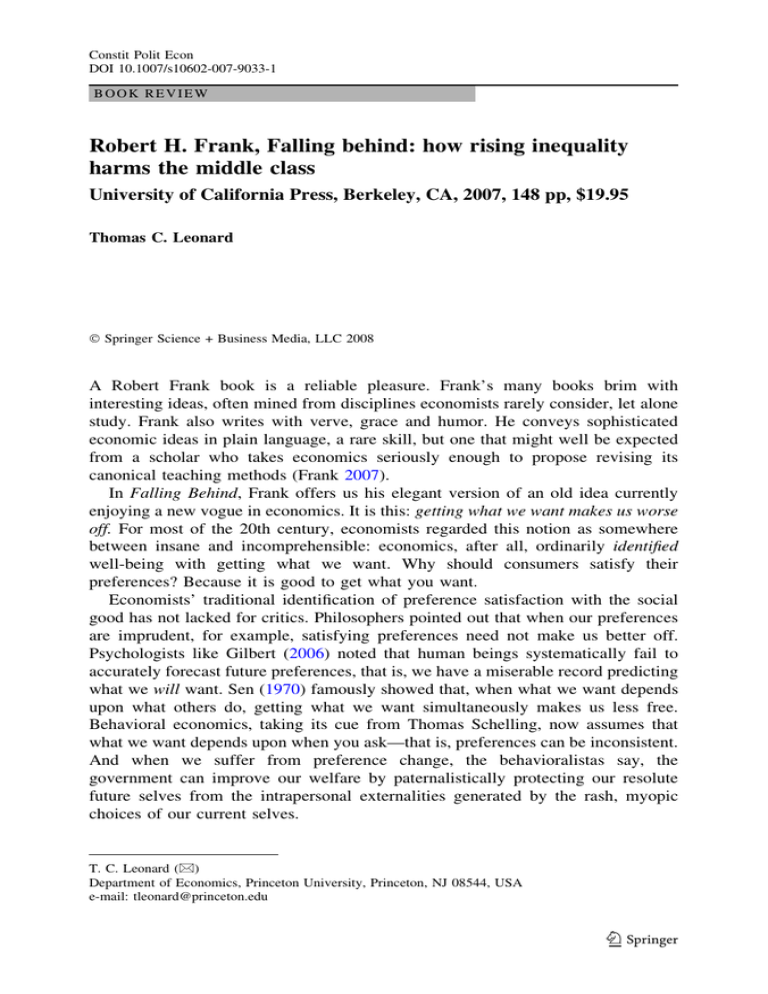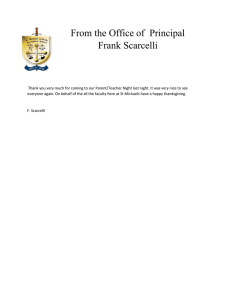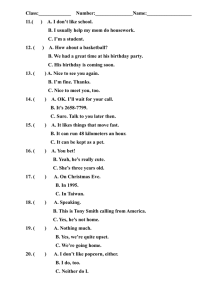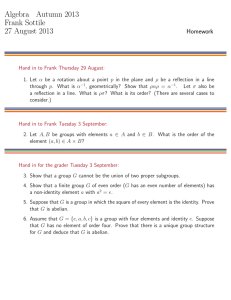Robert H. Frank, Falling behind
advertisement

Constit Polit Econ DOI 10.1007/s10602-007-9033-1 BOOK REVIEW Robert H. Frank, Falling behind: how rising inequality harms the middle class University of California Press, Berkeley, CA, 2007, 148 pp, $19.95 Thomas C. Leonard Springer Science + Business Media, LLC 2008 A Robert Frank book is a reliable pleasure. Frank’s many books brim with interesting ideas, often mined from disciplines economists rarely consider, let alone study. Frank also writes with verve, grace and humor. He conveys sophisticated economic ideas in plain language, a rare skill, but one that might well be expected from a scholar who takes economics seriously enough to propose revising its canonical teaching methods (Frank 2007). In Falling Behind, Frank offers us his elegant version of an old idea currently enjoying a new vogue in economics. It is this: getting what we want makes us worse off. For most of the 20th century, economists regarded this notion as somewhere between insane and incomprehensible: economics, after all, ordinarily identified well-being with getting what we want. Why should consumers satisfy their preferences? Because it is good to get what you want. Economists’ traditional identification of preference satisfaction with the social good has not lacked for critics. Philosophers pointed out that when our preferences are imprudent, for example, satisfying preferences need not make us better off. Psychologists like Gilbert (2006) noted that human beings systematically fail to accurately forecast future preferences, that is, we have a miserable record predicting what we will want. Sen (1970) famously showed that, when what we want depends upon what others do, getting what we want simultaneously makes us less free. Behavioral economics, taking its cue from Thomas Schelling, now assumes that what we want depends upon when you ask—that is, preferences can be inconsistent. And when we suffer from preference change, the behavioralistas say, the government can improve our welfare by paternalistically protecting our resolute future selves from the intrapersonal externalities generated by the rash, myopic choices of our current selves. T. C. Leonard (&) Department of Economics, Princeton University, Princeton, NJ 08544, USA e-mail: tleonard@princeton.edu 123 T. C. Leonard Frank’s big idea has roots in each of these critical traditions. His big idea is this: the consumption of some goods, which Hirsch (1976) called positional goods, leads to expenditure arms races that make all consumers of the positional good worse off. In other words, when what we want depends upon what others have, a consumption externality arises, and getting what we want will be inefficient. So while Falling Behind sometimes lapses into ready-for-NPR talking points, Frank’s critique is ultimately plain-vanilla neoclassical economics: consumption of positional goods creates market failure, a market failure the government can and should remedy by imposing a progressive consumption tax. The motivating illustration asks you to imagine two choices: World A, where you live in a 4,000 square-foot house and everybody else lives in a 6,000 square-foot house versus World B, where you live in a 3,000 square-foot house and everybody else lives in a 2,000 square-foot house. World A yields a 33% larger house, but in surveys most people choose World B. Why? Well, because housing is a positional good: we get additional satisfaction from a larger house not only because a larger house is better in absolute terms, but also because a larger house is better is relative terms. That is, we get additional satisfaction from having more house than the Joneses next door. Trouble is, the Joneses are no different, and when they too work harder to fund their own bigger house, our relative satisfaction gain disappears. We are now merely keeping up with the Joneses. Crucially, this is inefficient, because the absolute satisfaction gain of the larger house is insufficient of itself to justify the longer work hours expended to fund the larger house. Outcome: both we and the Joneses would be better off had we opted to work less and live in smaller homes. So why don’t we and the Joneses recognize the prisoner’s-dilemma logic of the situation, and agree to live in smaller houses, thereby realizing the greater satisfaction of extra hours spent socializing and relaxing, which surveys say makes us happy, and avoiding the cost of extra hours spent working and commuting, which surveys say makes us unhappy? The answer is that the game is multi-person: even if the Joneses and we successfully call a cease fire, the Smiths down the block, indifferent to our arrangement, will tack on an outsized addition. And, once that happens, our jumped-up East African plains-ape brain cannot be satisfied with our current house.1 Against our better judgment, and in violation of our former agreement with the Joneses, our limbic system compels us to hop back onto the hedonic treadmill, and forgo what really makes us happy, all in a selfdefeating drive to keep up with the Smiths. Once the Smiths expand, Frank argues, natural selection has wired us up to feel relatively deprived. And, moreover, the sting of relative deprivation is increasing in the size of the Smith’s addition. So, the greater the square-footage deficit, the larger the ensuing inefficiencies. The positional-consumption-creates-market-failure story is not new to Frank nor to economics. In 1892, Thorstein Veblen related the story in connection with his argument for the abolition of private property: 1 Apologies to Brad DeLong. 123 Falling behind: how rising inequality harms the middle class Human nature being what it is, the struggle of each to possess more than his neighbor is inseparable from the institution of private property… The inference seems to be that… there can be no peace from this… ignoble form of emulation, or from the discontent that goes with it, this side of the abolition of private property… Whether a larger measure of peace is in store for us after that event shall have come to pass, is of course not a matter to be counted on… (1919: 397–98). Frank offered versions of it in Choosing the Right Pond, Luxury Fever, and The Winner-take-All-Society (with Philip Cook). What Falling Behind contributes, apart from its wonderfully concise presentation, are two new wrinkles: the first wrinkle is a theoretical claim for the cause of positional goods: it is not envy but context that makes a good positional. The second wrinkle makes Falling Behind something of a tract for the times. Arms-race spending on housing, says Falling Behind, prevents middle-class folks from obtaining a decent education for their children, because rising housing costs compel the middle class to pay more for average schools, or to accept below-average schools. 1 Status hunger is in our genes Consider the first wrinkle. It is not, says Frank, that we envy our peers with larger houses, faster cars and bigger barbeques, it is, rather, that we unconsciously adjust our consumption norms and thus feel ‘‘relatively deprived.’’ Spend time in a prosperous neighborhood (family, office, school, congregation, etc.) and you will, if only unconsciously, adjust (upward) your consumption norms. Even if you do not envy the Smith’s square footage, you will come to see a bigger house as more normal. Spend time in the Peace Corps and you will adjust consumption norms downward. So, we do not envy the Smiths so much as emulate them. Another Smith, Adam Smith, also emphasized the role of emulating the rich in his explanation of why we want to ‘‘better our condition.’’ It’s clear why Frank might prefer context to envy; a progressive consumption tax designed to accommodate envy sounds rather less defensible than a progressive consumption tax designed to remedy the harmful effects of polluting consumption. The word ‘‘envy’’ seems to locate the source of the external harm in the person who feels relatively deprived, whereas ‘‘context’’ seems to locate the source of the external harm in the conspicuous consumers who ‘‘cause’’ the feeling of relative deprivation. The conspicuously consuming Smiths are just like polluters, and we and the Jones are the victims of their pollution.2 With ‘‘envy,’’ one focuses upon the envious, and responds: ‘‘you feel deprived, but you aren’t. Get over it.’’ With ‘‘context,’’ in contrast, one focuses upon the creators of context, and responds: ‘‘we don’t want your tract mansions polluting our peaceful neighborhood.’’ 2 It’s worth noting that while Frank invokes external costs to characterize the desire to possess more than our neighbors, his policy is not the standard Pigovian remedy of taxing positional goods, but instead a consumption tax on all goods, positional and other. 123 T. C. Leonard But both responses are wrong. External costs are jointly caused, as Ronald Coase (1960) rightly insisted. It takes two to create an arms race. The efficient policy response is to find the lower-cost solution to the harm of relative deprivation. The lower-cost solution could be to tax the Smiths, but it could also be to change our preferences. Frank’s critical tradition famously makes individual preferences endogenous, influenced by social factors. In this view, people can unlearn their desire to want more than others. But, its own critical tradition notwithstanding, Falling Behind says otherwise. Frank argues that status hunger is in our genes. Let’s assume status hunger is innate. Is innate status hunger sufficient of itself to explain positional goods? No. First, it cannot tell us which goods will be positional. Indeed, though he nods at things like ‘‘visibility,’’ Frank has relatively little to say about what makes a good positional. Second, to the extent that status hunger does lead to positional goods consumption, it need not result in wasteful expenditures. Today, Frank reports, leisure is a non-positional good: while contemporary survey respondents feel deprived by a relatively smaller house, they do not feel deprived by relatively shorter vacations. But, in Thorstein Veblen’s day, leisure was all but definitive of a positional good. A century ago, the rich signaled their rank with conspicuous consumption of leisure. Today, Veblen’s Leisure Class is mostly a thing of the past. In fact, the rich in America today work longer hours than do the poor. Second, it is also the case that rank can be signaled in less wasteful ways. Consider, for example, the greener-than-thou wealthy who choose to drive the lowcost Prius rather than the expensive Hummer, who hang their washing on the clothes line rather than contribute to global warming by running a clothes dryer, and who erect smaller ‘‘smart’’ houses while sneering at vulgar tract mansions. Some oldmoney communities in New England practice a like form of signaling; they wear drugstore watches and old clothes, and drive decrepit cars. Flashy jewelry, fancy clothes and expensive cars mark one as a parvenu. In such ‘‘reverse snobbery’’ communities, status still matters, and rank is still signaled with consumption that is conspicuous. But the positional good is not larger or more expensive, indeed the signaling of greater ‘‘virtue’’ ordinarily requires that the positional good demonstrate consumption restraint. In ‘‘reverse snobbery’’ regimes, status leads to less rather than more spending. 2 Survival of the fattest Some positional-goods arms races matter more than others. Frank’s account of outsized outdoor-grill apparatuses amuses more than offends. Outsized vehicles like the Hummer surely do impose an increased risk of fatality upon those of us who drive smaller cars. But so too does the vastly larger population of commercial trucks, a presumably non-positional good. And the greatest external cost from driving may well come not from vehicle-size mismatches, but from simply taking to the road in the first place.3 3 Edlin and Karac-Mandic (2006). 123 Falling behind: how rising inequality harms the middle class Frank’s more important claim in Falling Behind concerns schooling: rising inequality makes it harder for the middle class to provide a decent education for their children. The middle class ‘‘can either send their children to a school of average quality by purchasing a house that is larger and more expensive than they can comfortably afford; or they can buy a smaller house that is within their budget and send their children to a below-average school’’ (p. 45). There are two problems with this claim. First, a family motivated by education should be willing to be a smaller fish in a bigger pond: give up some of the pleasure of having more house than the Joneses in order to live in a better school district.4 It should, in other words, choose World A over World B. Frank’s rejoinder is that the 4,000 square-foot house in the better (World A) school district is overly expensive for middle class buyers, so they are obliged to settle for the 3,000 square-foot house in the inferior (World B) school district. But if the World A house is indeed higher priced owing to better schools, this is at odds with the book’s motivating premise: that most people prefer the World B house to begin with. It seems contradictory to argue that people are compelled by rising inequality to settle for a World-B house when that is what they say they already prefer.5 And, second, even if were true that greater income inequality has reduced educational opportunities for families in the middle, more expensive houses would seem to be only the proximate cause. The ultimate cause is an educational system that ties school quality to real estate prices: the local public school is a monopoly provider funded by local taxes on property. Good schools attract home buyers, which drives up home prices, which increases the property-tax revenues commanded by the good schools, which further increases school quality, which attracts still more demand, and so on. With bad schools, the effect goes in reverse— the cycle is vicious not virtuous. But there is no good reason that the quality of students’ education should be determined by the location of their residence. When parents have a choice among schools, as they do in that free-market bastion of Sweden, for example, the localschool monopoly is removed, and with it some of the sorting-equilibrium effects just sketched. Uncoupling school funding from local property taxes would further reduce the disparities. This is not to deny that rising income equality, which is real enough, may well increase the spending gap between good and bad schools. It is to say that a school system that ties school quality to real estate prices greatly amplifies the effects of income inequality. Shouldn’t an egalitarian concerned with market failure attend to the inequality-increasing effects of the market failure caused by a primary education system that has confused the guarantee of education with the monopoly provision of education? 4 Or, even better, rent in the superior school district. The housing bubble of 2000–2006 was one of ownership cost. Rental prices increased far less did than ownership prices, indeed relatively stable rents, the return on investment in residential real estate, provide the basis for the argument that the rapid run up in housing prices was a bubble. 5 There is no necessary contradiction here. It could be that survey respondents simply do not (or may not) consider school quality when considering the choice between World A and World B. But, if true, this explanation casts some doubt on the merits of the surveys that are the chief evidence for positional goods. 123 T. C. Leonard 3 When should other-regarding preferences be rejected? Imagine there is a constituency that is morally offended by Falling Behind. This constituency suffers an external moral cost of $20,000, say because it believes Bob Frank is advocating euthanasia of the rentier class. There are those of us who feel differently about Falling Behind, but reading it is worth only $10,000 to us (we are, alas, middle-class). The cooperative solution would be an agreement wherein the offended pay the rest of us not to read Falling Behind. At a price between $10,000 and $20,000, everyone would be better off. Of course, transactions costs may well preclude Coasean bargaining of this sort, in which case, a Paretian government can paternalistically intervene and give us the next-best solution: banning the book. Paretians prefer the voluntary solution—banning the book by agreement—to the coercive solution—the state bans the book—because the former is a Pareto improvement, while the latter is only a potential Pareto improvement. But, for Paretians, either outcome is better than allowing the inefficiency caused by the publication of Falling Behind. Two things seem to follow. One is that Paretians like Bob Frank ought to be interested in homeowners’ associations: a surprisingly widespread example of voluntary attempts by homebuyers to restrict what their neighbors can do with their homes. Want to make sure that the Smiths do not build an addition so large or vulgar that it upsets the neighborhood’s delicate ecology of envy? Join a neighborhood where additions are banned or restricted by prior agreement. And, attention happiness researchers: Frank’s hypothesis suggests that successfully restrictive homeowner’s associations, by mitigating arms-race expenditures, should, relative to like neighborhoods that do not so regulate, experience lower rates of relative deprivation, and enjoy fewer hours spent working and commuting. Second, the classical liberal, in opposition to the Paretian, argues that there are social goals other than efficiency. Freedom of intellectual expression is worth protecting even when Falling Behind leads to external harms in excess of its benefits. The freedom to erect monstrous starter castles may not be on a par with the freedom of expression, but the point (due to Sen 1970) remains: when what we want depends upon what others do, Paretian values can conflict with liberal values. Perhaps the cost to liberty of reining in steroidal spending is not too great. But how will the Paretian know when the cost to liberty is too great? It is clear that once we admit other-regarding preferences into the social calculus, as the good Paretian must, we can rather quickly arrive at outcomes that are efficient but unacceptable, not just to classical liberals, but also to 21st century liberals like Robert Frank. Take racist preferences. In the not so distant past, many homeowners preferred that their neighbors not look too different. Developers accommodated these other-regarding preferences by arranging restrictive racial covenants that excluded blacks and Jews. Governments upheld and enforced these exclusions. I am not suggesting that restrictive covenants that exclude minorities, and restrictive covenants that exclude indoor basketball courts are equally bad. They are not. I am suggesting, however, that Frank’s story needs more discussion of when nosy preferences are rightly admitted to the policy-making calculus and when they are not. Bob Frank surely agrees that preferences regarding the appearance of our 123 Falling behind: how rising inequality harms the middle class neighbors should not be admissible, even as Falling Behind insists that preferences regarding the appearance of our neighbors’ houses should be admissible. To say that racism should not count, but envy should, is to argue that, in between, there is point at which the Paretian state should stop ensuring that we get what we want. It would be worth knowing where Robert Frank thinks that point lies. 4 Compelling happiness A century ago, Veblen wanted to abolish private property in order to end the ‘‘ignoble form of emulation’’ that is wanting more than others. Bob Frank’s method, and that of other happiness researchers, is less radical: a consumption tax with marginal rates that go well above 100%. And Frank has the rhetorical advantage of claiming that inequality is not (merely) unjust; it is also inefficient. But both Veblen and Frank share an abiding faith in government’s ability to compel happiness, a faith erected upon on two subsidiary faiths: Benthamism and its longtime adjunct, paternalism. Bethamism says social science can establish scientifically that happiness is the paramount human aim. The ancient question, how to live well, has been answered, say the social scientists of happiness (Layard 2005). Social science can also, says Benthamism, define happiness, and measure happiness, sufficient even to compare it across persons. (Functional MRIs are the 21st-century version of F. Y. Edgeworth’s hedonimeter). Paternalism says that expert-guided government knows better what will make people happy, and therefore can and should and will compel its citizens to be happy when they make individual choices that fall short of optimal happiness.6 The claims of Bethamism and paternalism are as immodest today as they always have been, with the difference that, well, now happiness researchers are sure they have got it right. The very idea makes me unhappy. Let’s tax it. References Coase, R. (1960). The problem of social cost. Journal of Law and Economics, 3(1), 1–44. Edlin, A., & Karac-Mandic, P. (2006). The accident externality from driving. Journal of Political Economy, 114(5), 931–955. Frank, R. (2007). The economic naturalist: In search of explanations for everyday enigmas. New York: Basic Books. Gilbert, D. (2006). Stumbling on happiness. New York: Alfred A. Knopf. Hirsch, F. (1976). Social limits to growth. Cambridge, MA: Harvard University Press. Layard, R. (2005). Happiness: Lessons from a new science. New York: Penguin. Sen, A. (1970). The impossibility of a paretian liberal. Journal of Political Economy, 78(1), 152–157. Veblen, T. ([1892] 1919). ‘‘Some neglected points in the theory of socialism,’’ reprinted in The place of science in modern civilization, New York: B.W. Huebsch, pp. 387–408. 6 What evidence is there that a government Frank says has underfunded valuable public services can be entrusted to enforce the dictates of happiness science, and not, instead, continue to promote longer commutes and higher real estate prices with expanded zoning laws, and continue to increase its already large subsidies of happiness-destroying positional goods, such as home ownership and automobile travel? 123


